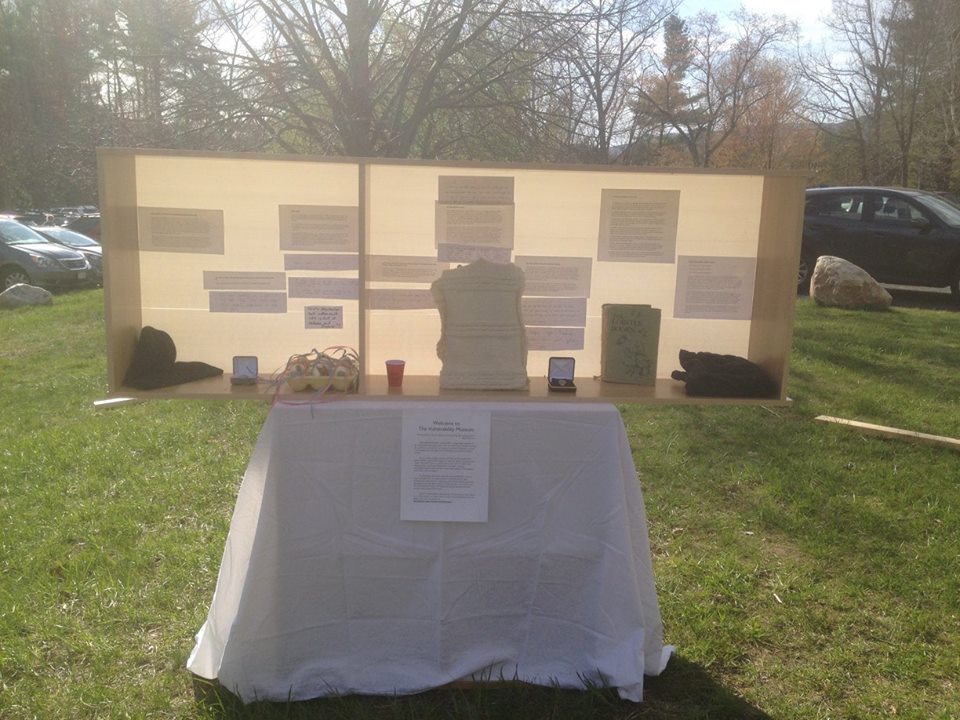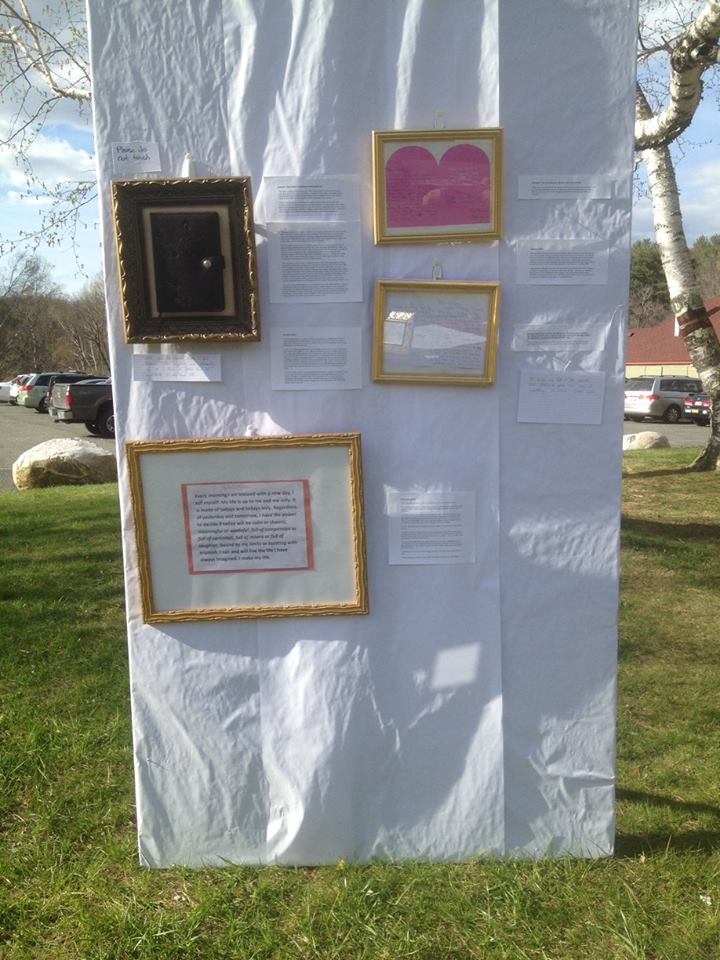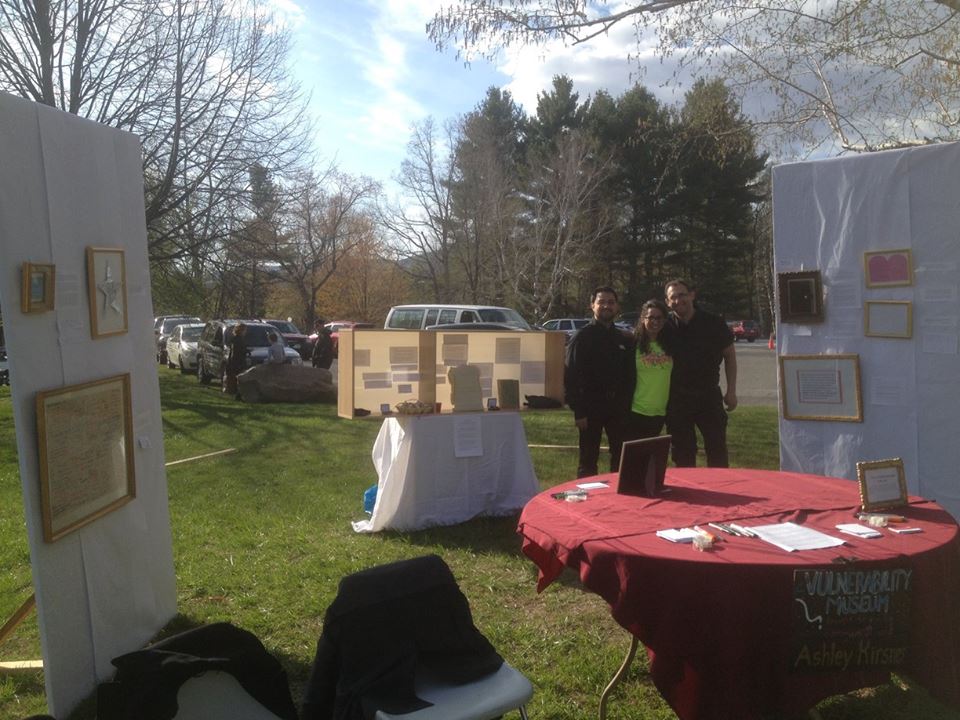The Vulnerability Museum
-written by Ashley Kirsner, co-founder of CommuniT Boston
What appeals to me most about tiny houses is pretty straightforward. It’s the relief from dealing with a dusty box of twenty mysterious gadgets from yesteryear whose purposes I can’t recall and whose chargers I will never find; the peace of a space housing all I need and nothing more—no boxes of clothes that don’t quite fit, no receipts for office supplies I can’t remember buying, and no accidental duplicate purchases that always result when I fail to take stock of what I already have. In this fantasy of what I call a “clean” life, I see in Miranda’s incredible project the physical manifestation of my own journey to live a clean psychological life. When Miranda asked me to bring communiT Boston’s latest project, the Vulnerability Museum, to the Tiny House Festival, it felt like an obvious fit to me. Both are manifestations of clean, streamlined lives: one in the physical realm, and one in the internal.

The Vulnerability Museum originated when I realized that I had a tendency to go on social interaction auto-pilot. I would say what I thought was the nicest and easiest thing I could say instead of what was true for me. I would say, “Tell me more!” when I really meant, “I wish I were near the snack table right now, and I’m having a hard time paying attention to you because I’m busy eyeing the pizza.” But I also found myself saying things like, “Thanks!” When what I really meant was, “I feel grateful you’re willing to go out of your way for me without a second thought, and I’m appreciative to have friends like you.” While these situations are quite different from one another, choosing the easier option in either situation gives me a feeling of psychological clutter, which builds up over time to make me feel like my relationships aren’t as authentic as I wanted them to be, and I end up feeling that I’m not being the kind of person I want to be. Upon realizing my counterproductive habit of prioritizing ease over psychological hygiene, I realized this might be the case for others, too.
 So, I decided to give myself and others a platform for some emotional spring-cleaning. I asked friends and strangers to lend me objects with emotional content behind them that they don’t ordinarily share with others, and asked these friends and strangers to tell me those stories. I displayed them in ornate frames paired with plaques detailing their backstories. Among our artifacts is a journal that a woman kept when she was suicidal alongside her poignant story of overcoming adversity. We have a pair of pants that no longer fit a woman with an eating disorder, and the recounting of her struggle to come to terms with her recovered body. We have a Post-it note that a young Marine left to his lover to break up with her, and its accompanying hilarious, dramatic, and moving story that is the inspiration for a book in progress.
So, I decided to give myself and others a platform for some emotional spring-cleaning. I asked friends and strangers to lend me objects with emotional content behind them that they don’t ordinarily share with others, and asked these friends and strangers to tell me those stories. I displayed them in ornate frames paired with plaques detailing their backstories. Among our artifacts is a journal that a woman kept when she was suicidal alongside her poignant story of overcoming adversity. We have a pair of pants that no longer fit a woman with an eating disorder, and the recounting of her struggle to come to terms with her recovered body. We have a Post-it note that a young Marine left to his lover to break up with her, and its accompanying hilarious, dramatic, and moving story that is the inspiration for a book in progress.
Seeing so many bold souls share their inner lives was one of the most inspiring experiences of my life. Surrounding myself with an environment of honesty made it possible to clean up my own psychological dust bunnies, and I’m finding that I’m getting better and better at politely interrupting a conversation to grab a slice of pepperoni.
If you want to inspire yourself to clean up your own inner world, come see the Vulnerability Museum at the 2nd BIG Tiny House Festival on July 16 at The Umbrella Community Arts Center from 12 PM – 6 PM.

